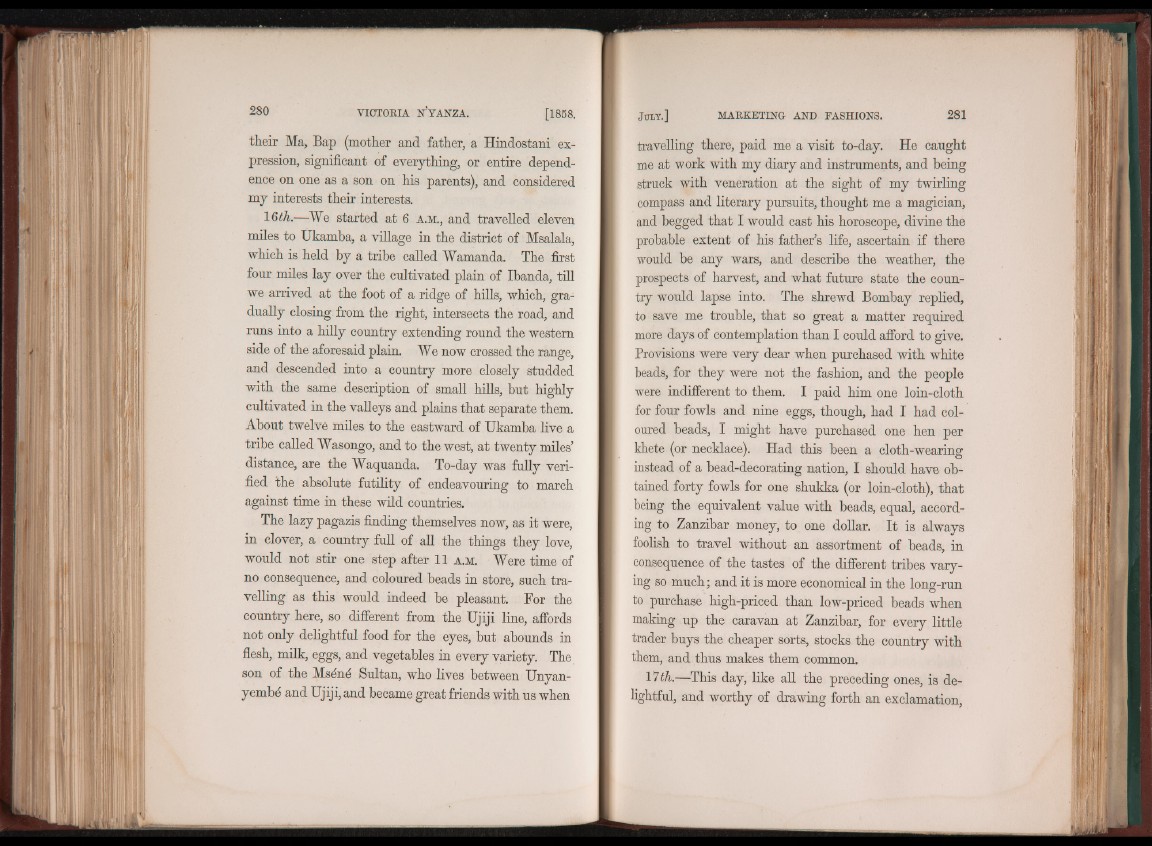
their Ma, Bap (mother and father, a Hindostani expression,
significant of everything, or entire dependence
on one as a son on his parents), and considered
my interests their interests.
16 th.—We started at 6 A.M., and travelled eleven
miles to Ukamba, a village in the district of Msalala,
which is held by a tribe called Wamanda. The first
four miles lay over the cultivated plain of Ibanda, till
we arrived at the foot of a ridge of hills, which, gradually
closing, from the right, intersects the road, and
runs into a hilly country extending round the western
side of the aforesaid plain. We now crossed the range,
and descended into a country more closely studded
with the same description of small hills, but highly
cultivated in the valleys and plains that separate them.
About twelve miles to the eastward of Ukamba live a
tribe called Wasongo, and to the west, at twenty miles’
distance, are the Waquanda. To-day was fully verified
the absolute futility of endeavouring to march
against time in these wild countries.
The lazy pagazis finding themselves now, as it were,
in clover, a country full of all the things they love,
would not stir one step after 11 a .m. Were time of
no consequence, and coloured beads in store, such travelling
as this would indeed be pleasant. For the
country here, so different from the Ujiji line, affords
not only delightful food for the eyes, but abounds in
flesh, milk, eggs, and vegetables in every variety. The
son of the Msdnd Sultan, who lives between Unyan-
yembd and Ujiji, and became great friends with us when
travelling there, paid me a visit to-day. He caught
me at work with my diary and instruments, and being
struck with veneration at the sight of my twirling
compass and literary pursuits, thought me a magician,
and begged that I would cast his horoscope, divine the
probable extent of his father’s life, ascertain if there
would be any wars, and describe the weather, the
prospects of harvest, and what future state the country
would lapse into. The shrewd Bombay replied,
to save me trouble, that so great a matter required
more days of contemplation than I could afford to give.
Provisions were very dear when purchased with white
beads, for they were not the fashion, and the people
were indifferent to them. I paid him one loin-cloth
for four fowls and nine eggs, though, had I had coloured
beads, I might have purchased one hen per
khete (or necklace). Had this been a cloth-wearing
instead of a bead-decorating nation, I should have obtained
forty fowls for one shukka (or loin-cloth), that
. being the equivalent value with beads, equal, according
to Zanzibar money, to one dollar. I t is always
foolish to travel without an assortment of beads, in
consequence of the tastes of the different tribes varying
so much; and it is more economical in the long-run
to purchase high-priced than low-priced beads when
making up the caravan at Zanzibar, for every little
trader buys the cheaper sorts, stocks the country with
them, and thus makes them common.
17 th.—This day, like all the preceding ones, is delightful,
and worthy of drawing forth an exclamation,